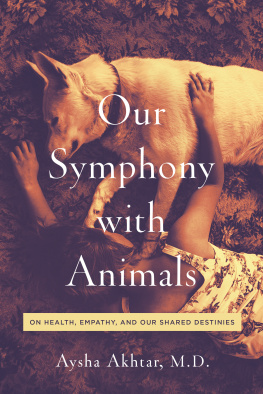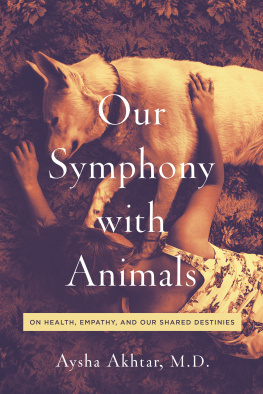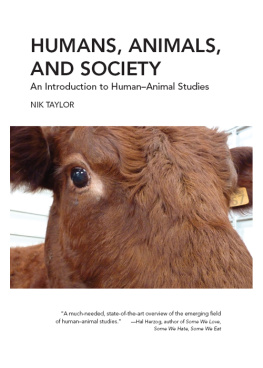Contents
Guide

Our
Symphony
with
Animals
ON HEALTH, EMPATHY, AND OUR SHARED DESTINIES
Aysha Akhtar, M.D.

OUR SYMPHONY WITH ANIMALS
Pegasus Books Ltd.
148 W 37th Street, 13th Floor
New York, NY 10018
Copyright 2019 by Aysha Akhtar, M.D.
First Pegasus Books edition May 2019
Interior design by Maria Fernandez
All rights reserved. No part of this book may be reproduced in whole or in part without written permission from the publisher, except by reviewers who may quote brief excerpts in connection with a review in a newspaper, magazine, or electronic publication; nor may any part of this book be reproduced, stored in a retrieval system, or transmitted in any form or by any means electronic, mechanical, photocopying, recording, or other, without written permission from the publisher.
The views presented in this book are those of the author and do not necessarily represent the views of the Department of Defense, the U.S. Public Health Service, or the U.S. Army Medical Department.
Library of Congress Cataloging-in-Publication Data is available.
ISBN: 978-1-64313-070-5
ISBN: 978-1-64313-167-2 (eBook)
Distributed by W. W. Norton & Company
For Sylvester
Contents
by Carl Safina
by Carl Safina
A t five today as every day, an hour before dawn I felt our dogs jump onto the bed. They curled up by our feet and we all dozed a bit until my wife said Good morning. Our first words are their cue to start the days greeting and the licking. Its a custom they started; we didnt train it. And then its time to hit the floor and start the day. Every day they get us out of bed at dawn. And though thats not always my favorite ideaif Ive had a late night of writing or weve been outdawn is always my favorite time of day. So Im always grateful that they get us going. Downstairs they get let out; the coffee goes on. They get let in and fed. Right after they eat they seek us out and seem to thank us, and then they rest while I fill the bird feeders, feed our rescued parrot. Then we usually make breakfast, often sharing a bit with them or letting them lick up leftovers. And by then its time to let our chickens out. The chickens are not in a rush to venture out at dawn; thats when the hawks hunt and the last fox goes to sleep. So they wait inside, and when I see them appear in their screen coop the dogs and I all go out, I open the coop, and our hens scurry to the back porch steps, where I feed them while the dogs take in the scene. In some years weve had added duties: an orphaned squirrel or raccoon, or a baby owl found fallen and near death. Healing them, their need and seeming appreciation of our care, their feeling comfortable and safe in our presence; this is a great honor and a daily lesson.
The lesson they refresh for me daily is: we are alive, now. They remind me to live present and ready to appreciate what comes our way. They break us through the hurt and grief and gloom that humans create for ourselves, the disappointments and disillusionments. They, like we, come into the world with none of it. In your opportunity to be kind to them, they repay with daily reminding of how pure and innocent living beings can be with each other. If we choose.
After everyone is fed we may take the dogs to the beachthey love thatbefore we get to work. I love it too. Watching them run and chase and swim, getting wet and sandy, I realize afresh that they get us smiling more times a day than any single aspect of our life. They bless us with their mess. I often think of the words of my friend and hero Peter Matthiessen, who wrote in The Snow Leopard , And it is a profound consolation, perhaps the only one, to this haunted animal that wastes most of a long and ghostly life wandering the future and the past on its hind legs, looking for meanings, only to see in the eyes of others of its kind that it must die. What I see in the eyes of others not of my kind is: lets live. Lets just live.
In a world of wounds, the invitation into compassion is the greatest gift a human can be offered. The symphony that is the controlled chaos of our morning, whether it is the noise of the chickens or a sandy snout against my hip, awakens and lifts my spirit like music. It is our best route out of grief.
I am a scientist, but many scientists have long wrongly believed that only humans are conscious and can feel anything. That belief is unscientific. It is also an excuse for humans to abuse the non-humans among us. There is far too much of this. And of course there is far too much abuse of other people. Other animals are considered brutes, or savage beasts. But as Herman Melville noted in his great psychological classic, Moby-Dick , There is no folly of the beasts of the earth which is not infinitely outdone by the madness of men. Abuse of animals often goes hand in hand with abusive behavior toward people. Learning to treat animals with gentleness gentles people toward people too. Humaneness is good for humans and humanity as a whole.
The organizing principle of all biology is that all life is kin, related and genetically connected down through billions of years of unbroken chains of ancestors and living descendants. Many of our genes have been on Earth for hundreds of millions of years. Think of it this way: the physical similarities you see in other specieseyes, ears, skeletons, organs, heartbeatscarry into similarities we cant see in brains and their functioning. But you can see the functioning of minds in the logic of behaviors. And more formally, behavioral neuroscience has come light-years. Researchers in these branches of science have looked at brains as they function, in MRI machines and using other modern techniques. They have watched dogs brains light up when shown photos of people and dogs they know, and watched the brains of sleeping rats as they dream. There is simply no question, and there is plenty of proof, that their minds are generally as similar to our own minds, as are their bodies. In light of so much new evidence, many scientists now agree that the scientific reality is: everything in the living world is on a continuous range, and this includes the similarities in the nervous systems of various kinds of creatures, and thus in their mental functions and emotional capacities.
When we lose a loved one, including a loved pet, we grieve. And some animals grieve, too. Any animal capable of emotional bonding shows grief when youd expect it. Grief isnt solely about life or death; its mostly about loss of companionship, loss of presence. Author Barbara J. King says that when two or more animals have shared a life, Grief results from love lost.

We know that humans can enjoy life and love or miss companions. The remaining problem is that we tend to deny, or mistrust, the idea that any other creature can. This is a great gap in our appreciation and understanding of who we are and who we are here with on this only known living planet.
Albert Einstein said our task is to widen our circle of compassion to embrace all living creatures and the whole of nature in its beauty. Unity of need becomes unity of purpose. To deflect disaster, this is where we must be headed next.
And if youd like to know whats in it for you, Confucius is credited with saying, He who wishes to secure the good of others, has already secured his own. Dr. Albert Schweitzer observed, One thing I do know: the only ones among you who will be really happy are those who have sought and found how to serve.










